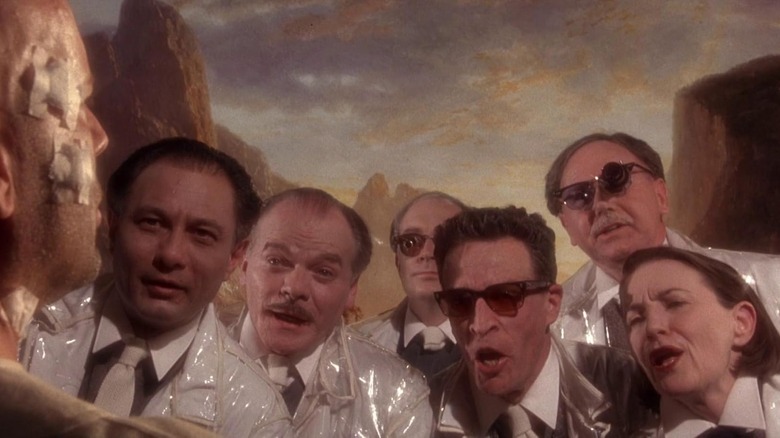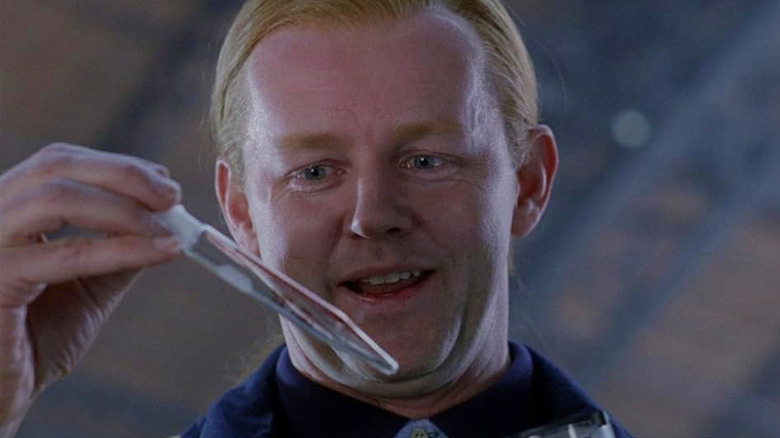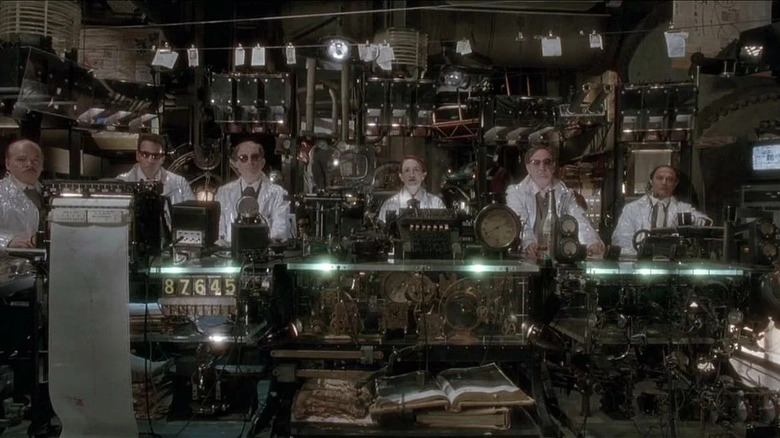The Scientist Scene In 12 Monkeys That Caused Arguments Behind The Scenes
This article contains spoilers for "12 Monkeys."
Terry Gilliam's 1995 time-travel freakout "12 Monkeys" begins in the not-so-distant future of 2035, when Earth is recovering from a worldwide plague that wiped out most of humanity. The survivors have moved underground and are kept in cages, overseen by a tyrannical cadre of cruel, tribunal-like scientists. These scientists also have access to a clunky, not-very-accurate time machine that they use to shunt hapless draftees into the past, forcing them to investigate the origins of the virus. The film's protagonist, James Cole (Bruce Willis), is eventually sent back in time to 1990 and 1996, when the plague began.
The time machine, however, toys with the user's brain, so Cole isn't always cogent during his visits to the past. He ends up falling in love with a woman in the past (Madeline Stowe) and discover a 1990s conspiracy involving an eco-terrorism group called the Army of the 12 Monkeys. He also learns that an unexpected villain is responsible for the plague: a mild-mannered virologist named Dr. Peters (David Morse).
One of the final scenes of "12 Monkeys" sees Cole being killed by security guards at an airport while pursuing Dr. Peters, who flees onto an airplane with a suitcase full of plague vials. When on the plane, Dr. Peters sits next to a woman who nihilistically muses to herself that humanity is in trouble, what with shootings at airports and all. The woman is played by actor Carol Florence ... who also played one of the scientists from 2035.
What is happening? Were the scientists also going back in time? Is she the mother of the 2035 character? According to an oral history printed in The Hollywood Reporter in 2021, even the creatives behind "12 Monkeys" weren't too sure what that scene meant.
Why was the scientist on the plane?
"12 Monkeys" was written by David and Janet Peoples, based on Chris Marker's 1962 short film "La Jetée." The original short was famously told using mostly still images and a laconic narrator. To expand the short into a feature, the writers added a lot of subplots and new characters. David and Janet Peoples recalled butting heads with "12 Monkeys" producer Charles Roven during the writing process. It seems that the scene of Dr. Peters meeting the future scientist on the plane was the producer's idea. The writers didn't think it made any sense, with David Peoples telling THR:
"We had an argument [with Roven] about seeing the scientist played by David Morse on the plane with the scientist from the future. We didn't want that scene in. We didn't think it helped. We didn't think it was any good. We were against it."
Janet Peoples pointed out, however, that when they finally inserted the scene, it might have been the right call. The scientist claims to be in insurance, a handy thing to be selling as the world falls apart. That revelation, which was Janet People's idea, made the scene come together. Not only was it a gallows punchline, but it also revealed that the scientists from the future had much more cynical motivations. They didn't so much want to cure the plague as take advantage of society's downfall. They were playing their own "Big Short" style game with the human populace.
And that's the kind of twist one might expect from the notoriously cynical Terry Gilliam.
How the 12 Monkeys writers cracked the code
However, it took a "Eureka" moment for Janet Peoples to come up with the joke. As David Peoples remembered it, he and Janet were trying to make Roven's idea work when Janet cracked the code:
"Chuck kept insisting on it. Janet and I kept beating our heads against a wall. 'Well, what's supposed to happen?' Jan and I would each go off to our separate space and we would write the scene and we would show it to the other person. It went back and forth between us and it was just a dog. Then Jan hands me this piece of paper and I look at it, and it just says, 'I'm insurance.' That blew my mind. It was so wonderful."
The scene probably doesn't hold up to a lot of intellectual scrutiny; it starts to introduce causality loops and other writerly tangles that typically come in time travel stories. It also might cause viewers to ask what the heck is going on with the scientists. What was their goal in all of this? And why did they need Cole for their scheme? It may require multiple viewing to answer those questions accurately.
Still, in the moment, "I'm in insurance" is a perfect little sardonic joke to wrap a bleak, absurd film like "12 Monkeys." The flick ended up becoming a hit and is something of a classic to this day. It even inspired a well-regarded TV series in 2015 that ran for 47 episodes over four seasons. The show's creator, Terry Matalas, is currently working on a "Vision" TV series for Marvel. "12 Monkeys" was the first step on that particular path.


